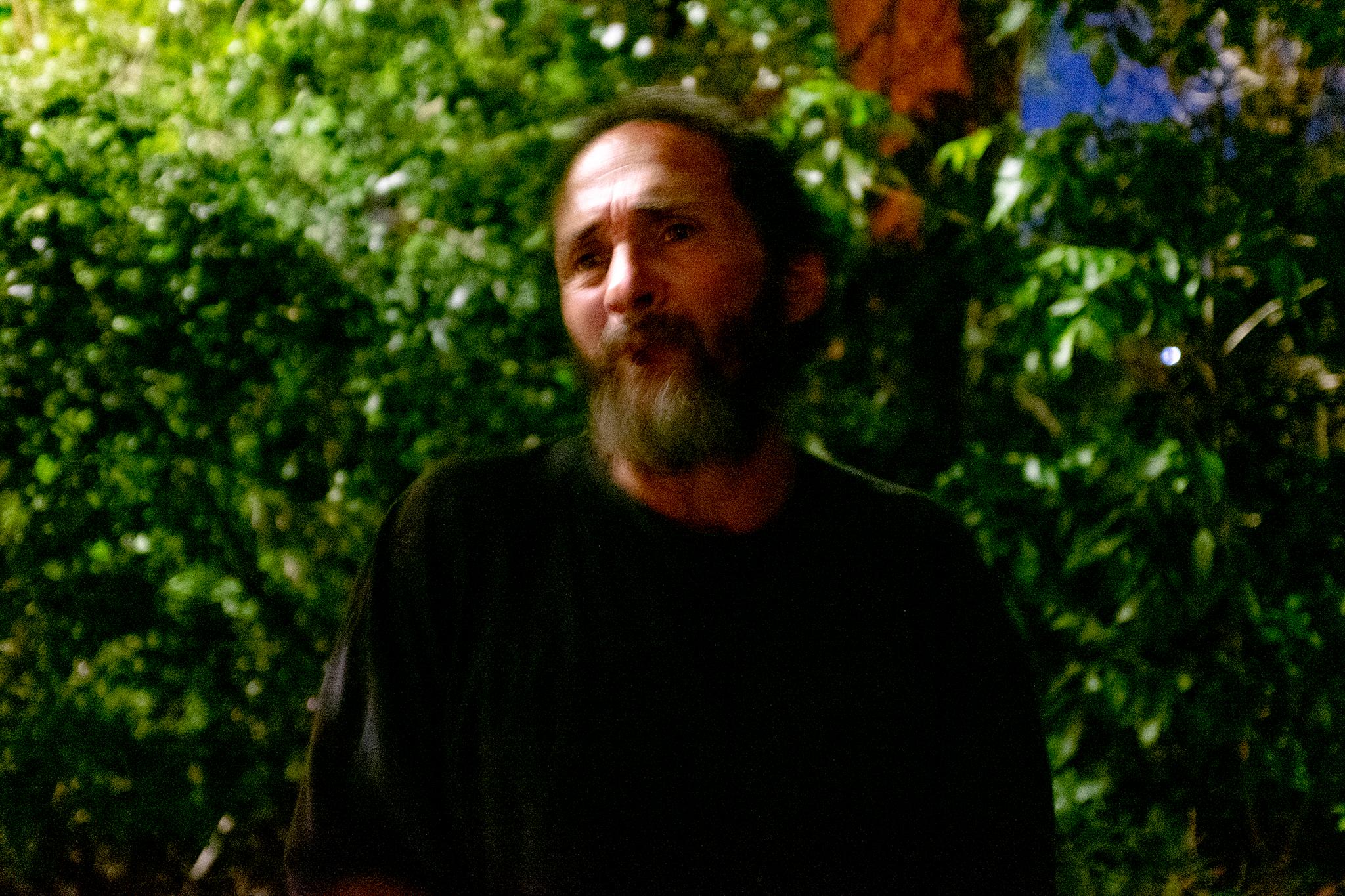Updates with Collins's Denver camp cleared on June 17.
It was a lot of pressure and stress for a move of 100 feet.
A week after officials in the Denver suburb of Englewood declared a stretch of the Platte River banks off limits to campers, Walt Collins and several friends -- including some he'd just met -- were settled in a circle of young trees a short walk into Denver from where they had been living in homelessness. With few shelter and housing options, the outcome was predictable.
Down river in Englewood at midday Tuesday, the occasional cyclist whirred by as a work crew turned tree branches into wood chips near the Dartmouth Avenue bridge, where the Little Dry Creek and South Platte River recreational trails converge. Beneath the bridge and elsewhere, patches on both banks were bare of weeds and grass and tamped as flat and hard as the courts at Roland-Garros. Holes could be seen that might have been dug to store food or to create a warm place to sleep. The flattened earth and burrows were like evidence of past habitation at an archaeological site. Gone were the people -- and their tents, tarps, blankets, sleeping bags, bicycles, shopping carts, gas grills, rolling suitcases stuffed with clothing, batteries and solar panels to charge cell phones.
Englewood Police spokesman Sgt. Chad Read said 100 or so people had been scattered in small camps before they were asked to move along. He said Tuesday the last of those campers had just vacated the area. He could not say where most of them had gone. He'd heard his officers discuss the presence of "some transient people throughout the city.
"But that's not unusual," Read said. "It's hard to say whether this is a result of the Platte River mitigation or not."
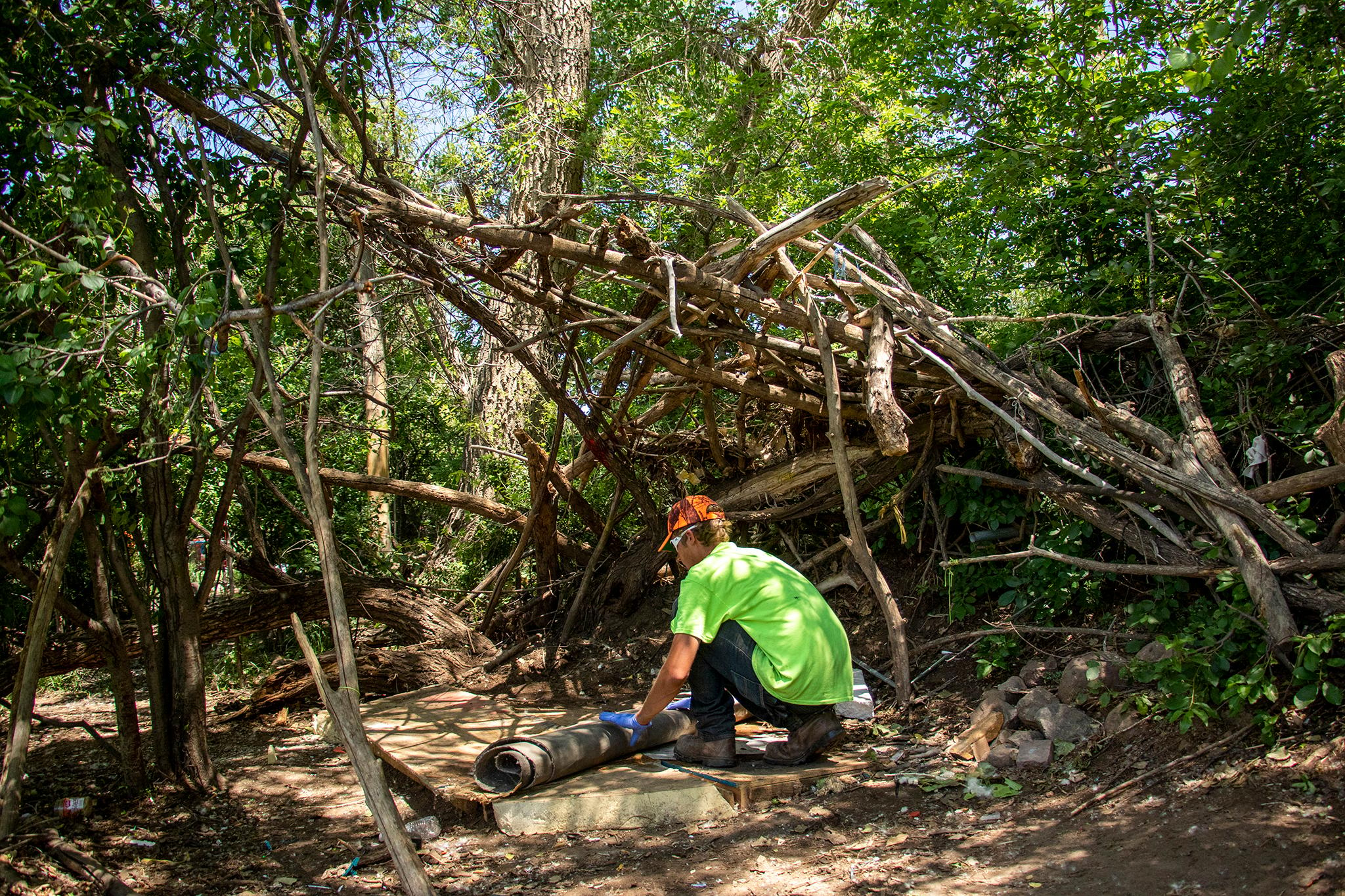
South Suburban Parks and Recreation rangers noticed an up-tick in people living in homelessness elsewhere along the Platte after the camps were cleared, said Becky Grubb, the communications manager for the special local government district. South Suburban manages parks and recreation services, including riverside trails, south of Denver in Douglas, Jefferson and Arapahoe counties.
Terese Howard of the advocacy group Denver Homeless Out Loud said one of her colleagues had met a few people from the South Platte camps who had made it as far as Denver's Sonny Lawson Park in Five Points. She said that if the pattern of similar sweeps held, most of those displaced were sticking close to Englewood.
Englewood officials had announced May 20 that the camps along a six-block stretch of South Platte River Road ending at Dartmouth would be cleared June 4. Concerns had been raised about keeping order in the area and maintaining cleanliness in the river and on its banks. Police cited a fight earlier in May between two men experiencing homelessness that ended in a stabbing at one of the dozens of small camps. Police officers also have reported finding trip wires, hypodermic needles and human waste and expressed concern camp dwellers could be in danger if the river flooded.
The weekend before June 4, Collins packed up his camp located on the river's east bank.
"I picked up every scrap of paper," Collins said.
He said he had always kept his area as neat as he could. He bristled at the suggestion some saw the camps as an eyesore.
"Camping is not ugly," he said. "People are not ugly."
He knows homelessness invites contempt. Sometimes drivers on South Platte River Road shout obscene insults from their car windows, he said.
He said people with homes think: "You ain't got a place to stay? You can't pay rent? You're a criminal."
Collins, thin with graying dark hair and a grayer beard, speaks in agitated bursts that are evidence of the stress he was feeling. He tends toward rhetorical questions he often answers himself.
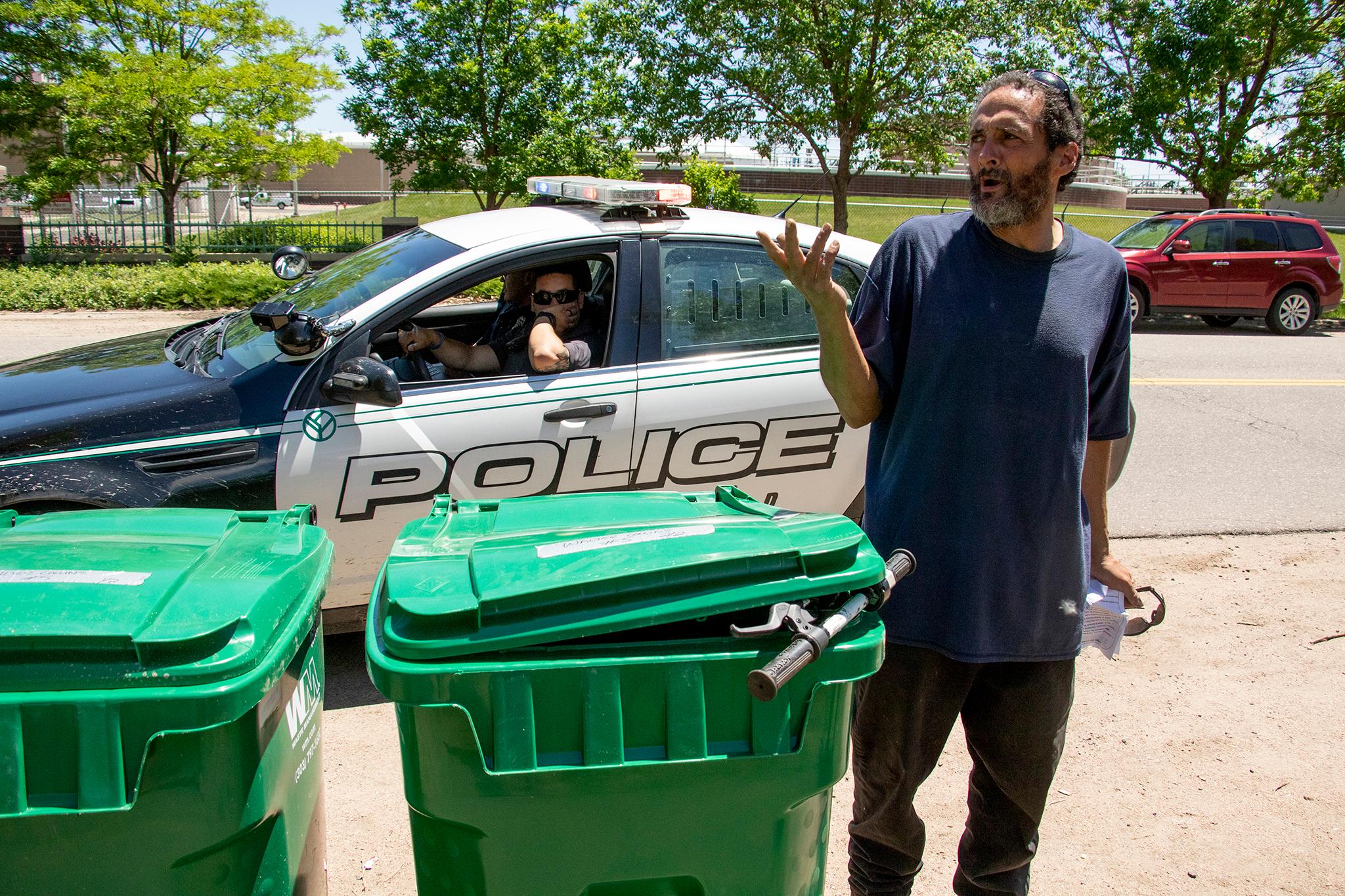
The morning of June 4, his belongings were stacked neatly by the side of the road. Collins topped the pile with a tiny succulent in a red plastic pot the size of a cup from a child's tea set. Then he draped it all with a white tarp on which he wrote in blue marker: "Hi. I'm Walt. Please don't take. Not trash."
He added his cell phone number, then headed out on his bike to scout for a new place to rest.
Others' belongings drifted from the river bank up to the road. The scene would for several days resemble the aftermath of a sudden natural disaster. In reality, the sweep was for many an episode in a slow, personal unraveling. Instead of FEMA workers or National Guardsmen, Englewood police officers, who led the sweep with help from colleagues from Denver, were accompanied by mental health specialists and homelessness service providers.
Rumors spread of free camps in Lakewood. Some people living in homelessness headed further south along the recreational paths, pushing bikes and carts loaded with gear. No one seemed to have a plan.
Collins didn't find a new site to camp on June 4. Even if he had, it was unclear how he would have moved his belongings. He spent the night along the river bank just inside Denver. He didn't get much sleep, he said. A park ranger woke him at 5 a.m. on June 5 and Collins headed back to Englewood to see if his belongings were where he had left them. They were.
Collins said he had been living along the Platte several weeks when he heard the sweep was planned. The 52-year-old grew up in a military family in the Denver area and has been without a home for at least a decade. He dislikes shelters and is used to keeping on the move, usually up and down the Platte between Littleton and Denver. He gets by on food stamps, what he collects from pantries and earnings from selling scrap metal he picks up and mowing lawns. During the day on June 5, Collins rode his bike to a nearby supermarket and came back with food he shared with friends.
"I like to work," Collins said.
He said he bagged groceries as a teen and later sold office furniture.
He said it was once possible to rent an affordable place without even putting down a deposit in the Denver area.
"Now, the rent prices have skyrocketed. What's a person supposed to do?" Collins said. "If you're already unstable, if you don't have a place to stay, it's hard to get back on your feet. A place to stay. Somewhere to eat. A place to shower."
He said he sometimes looks up at one of the new high rises going up in Denver and thinks: "They could take every homeless person in the city and put them in there and still have room. Couldn't you put some people in there?"
He described homelessness along the river as a constant battle against spiders, rats and raccoons.
"The smell is nasty. There's noise all the time," he added. "I guarantee it, no one would be down here if they had a place to go. It sucks down here."
He said Denver's shelters -- Englewood, a city of about 34,000, has none -- are hubs of drug activity. He has struggled with drug, alcohol and mental health challenges, he said.
Collins seemed to feel he no longer had choices. But he worried about a man in his 20s he met along the river shortly before the sweep and whose belongings he'd taken to keeping an eye on during the days. Perhaps, Collins said, his new friend could get training with the Job Corps, or talk to someone at Denver-based Urban Peak, which has education, employment, housing and other programs for young people experiencing or at risk of becoming homeless.
"He's still young enough to have that opportunity," Collins said. "Instead of being here."
Englewood police had acknowledged June 4 that some people had no place to go or no way to move their belongings, so would be given a few more days beyond the deadline
Mark McIntosh, founder of a fitness program to help people address addiction called A Stronger Cord, was among the outreach workers on the banks on June 4. He was able to direct some people to Giving Heart Engelwood, a drop-in center on South Broadway that offers meals, clothing and connections to the internet and services. McIntosh said a few people were able to get on housing wait lists.
"Obviously, we need more housing," McIntosh said.
"It's so darn expensive for people to live in Denver," he said. "Where are they going to live?"
Giving Heart's Cynthia Dekker, who helps connect people with resources such as replacing identification or getting benefits, said many who drop in ask about housing.
"And housing is really difficult. Permanent housing, there's waiting lists forever," she said. "There's shelters. A lot of people have had bad experiences with shelters and are reluctant to go there."
"We do have a lot of people that do work," she added. "They have income, but they can't save enough for the first and last month's rent."
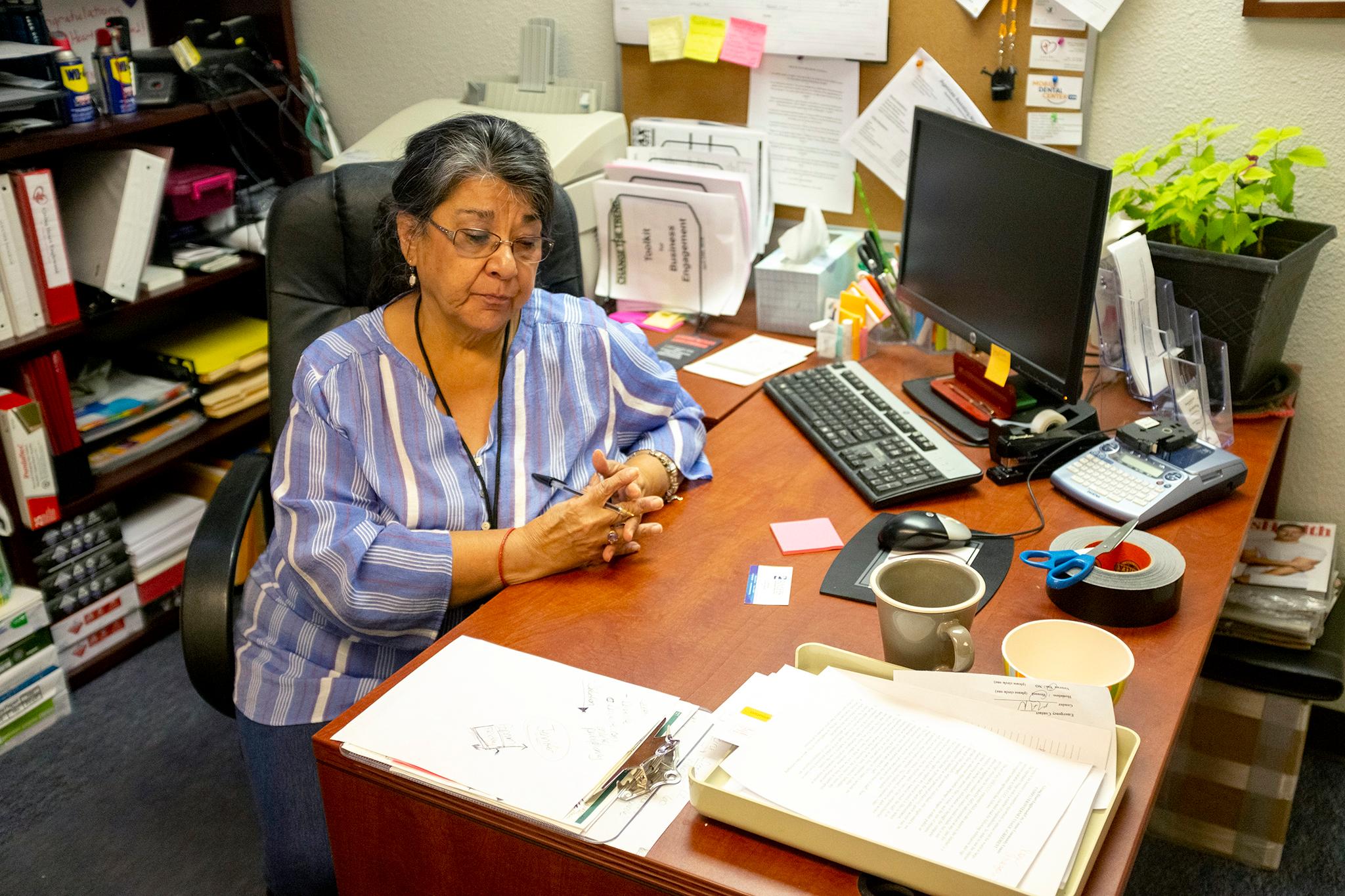
Howard of the advocacy group Denver Homeless Out Loud said the services offered to people being asked to move along typically fall short.
"They do not address the fact that people need somewhere to live," she said.
A Stronger Cord and Giving Heart are both part of Change the Trend, a network McIntosh said was "trying to find some solutions" to homelessness in Englewood, Littleton and Sheridan.
"Just moving these people around is not the solution," McIntosh said. "We've got to give hope to those who are part of the population that would like to change."
In the short term, McIntosh said, Change the Trend needs more volunteers, including for its program to match mentors to people living in homelessness. In the long term, he envisions churches building tiny homes on their parking lots and investors buying motels on Broadway to convert into supportive housing. Addressing homelessness, he said, will require a regional approach and a public-private-faith partnership.
"We can never get rid of homelessness," McIntosh said. "But we can certainly lessen its impact."
The night of June 5, Collins slept in the open on the side of the road next to his pile of belongings.
The morning of June 6 he was awakened by police officers, including one who had something to offer: 65-gallon trash bins that could be used for storage. The officer said the green plastic bins would be moved for those who needed them to a nearby Englewood municipal facility where the containers would be kept for 30 days at no charge. Collins gratefully took two, writing his name in black marker on strips of silvery tape across the lids.
"I don't have to worry about this now," he said of his belongings.
He asked for bins for friends who were away when the officers arrived. After he was satisfied with the way he had arranged clothing and batteries and other equipment in his bin, Collins started sorting his friends' items in preparation for filling theirs.

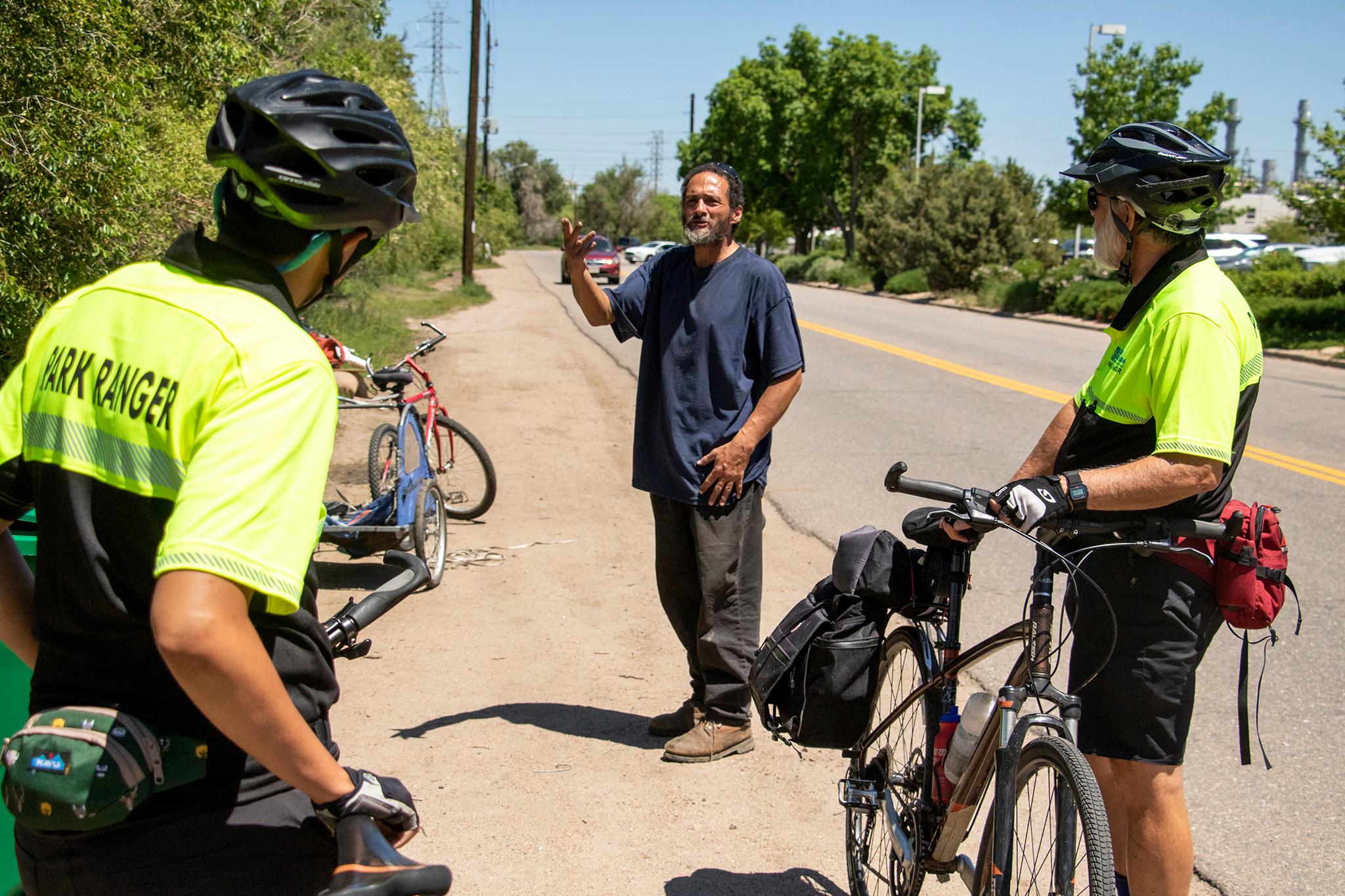
As he worked, two South Suburban Parks and Recreation rangers rode up on bicycles and asked where he would go. Instead of answering, Collins began a story about a ranger he said had once harassed him. The two cyclists listened politely, then handed Collins a flyer that listed the names and addresses of service agencies. A boldface line jumped out: "provides housing and necessities." But a call revealed that rather than directly housing people experiencing homelessness, the organization helped facilities like shelters that needed renovations.
A police cruiser drew up and two officers offered Collins more storage bins, which he said he didn't need. A worker with the city's clean-up crew rolled over a shopping cart he thought belonged to Collins and asked:
"Do you want to keep this, sir?"
Collins told him the cart wasn't his.
"People are scrambling for a place to go," Collins said.
He was starting to advise his friends to go Denver, saying if they kept their camps orderly they might not be asked to move again, at least for a while. Denver has a camping ban, but it is only intermittently enforced.
That night, no longer worried about his belongings, Collins took his own advice. He went 100 feet into Denver past a sign that read: "Welcome to Englewood." He and several other men stretched out in tall grass on the roadside opposite the bank. When sprinklers came on in the middle of the night, Collins and one other man moved down to the riverbank. They were wary of pitching a tent, not wanting to draw attention.
The morning of June 7, Collins was looking for his cell phone.
"When you're moving around, it's hard to keep track of your stuff," he said. "Every day you're stressed and upset. Every day."
Other people, he said, had lost more important things -- letters from their children, IDs. Collins had used his phone to listen to music, read the news and keep track of the hours and the days.
Howard of Denver Homeless Out Loud said phones and documents often get misplaced in sweeps.
Items such as drivers licenses, she said, are crucial to getting jobs and housing. Replacing them can be "a huge ordeal that does nothing but set people back many steps from reaching such goals as finding housing or meeting other basic needs."
And losing a phone means "in a time of crisis, you have no way to connect," Howard said.
Collins's aloe, at least, wasn't lost. Collins, who had found it in the trash, gave it to a friend who had been camping nearby who he thought would do a better job of keeping it safe.
"That was a cool little plant," he said. "I tried to put it where it wouldn't get hurt."
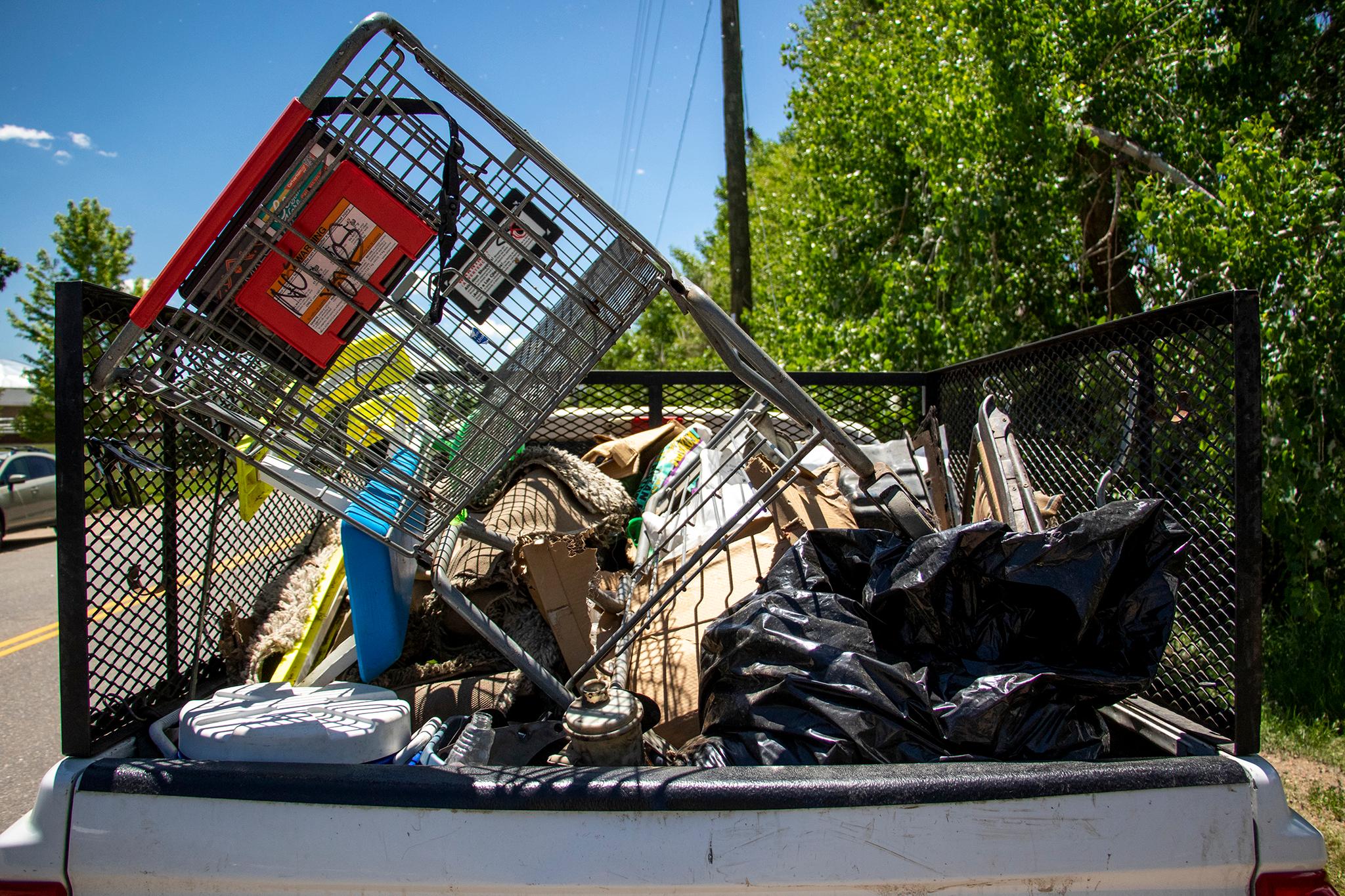
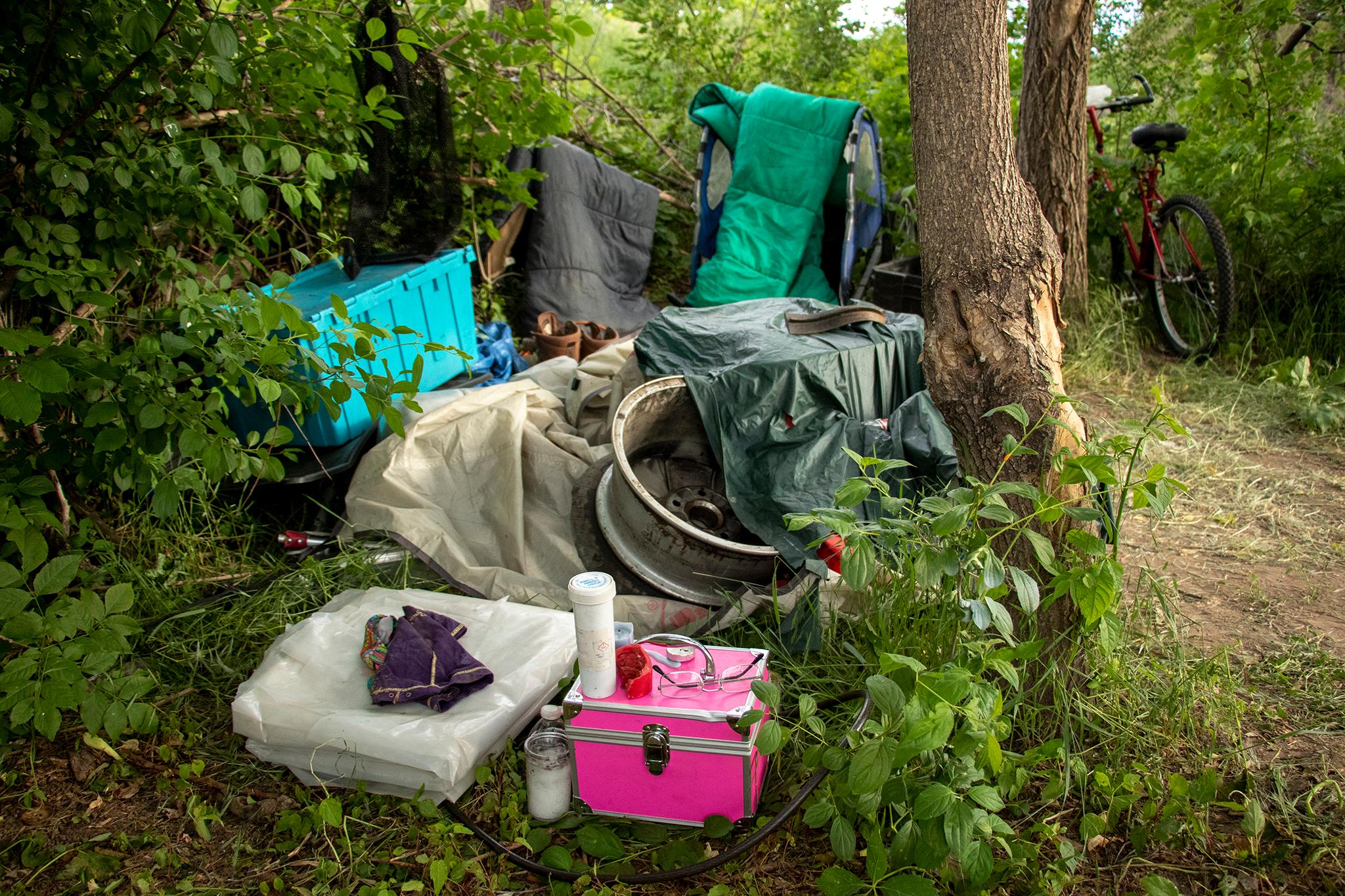
By the end of the weekend, Collins's camp was beginning to look lived in. Sunday night, Collins rescued pizzas from a restaurant dumpster in downtown Littleton. The woman to whom he'd given his aloe added food she'd gotten from a pantry earlier in the day. The meal was shared by eight people.
Tuesday morning, rangers from Denver Parks & Recreation woke Collins and his fellow campers. But they did not ask them to move.
On June 17, Collins was not at the site in Denver where he had moved on June 6. His belongings and those of others who had joined him had been meticulously cleared away. A call to his cell phone went unanswered and the phone was no longer set up to record messages. Across the Platte that morning, a half dozen people who had been moved out of camps along the Platte by Englewood police were being asked to move by Denver police. A Denver officers advised a young woman in the group to go downtown and speak to the Colorado Coalition for the Homeless about adding her name to wait lists for affordable housing. "I'm not going to lie to you, it will take time," the officer said.
One of the campers said she knew Collins, but did not know where he was. The Denver police officers said they had not been aware of Collins's camp, so had not asked anyone there to move along.

